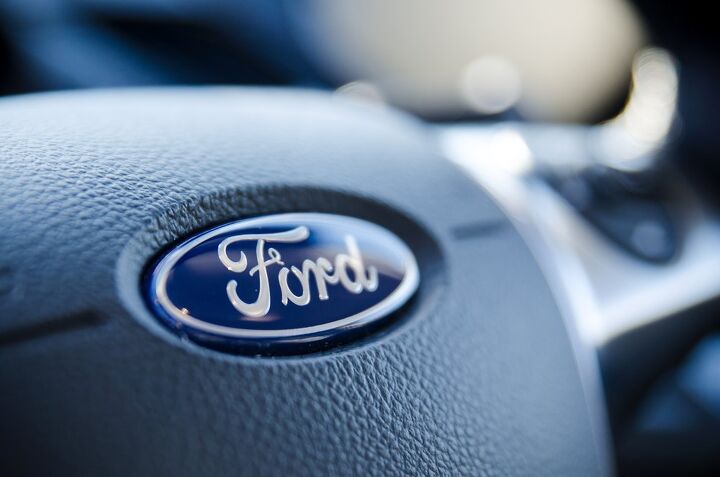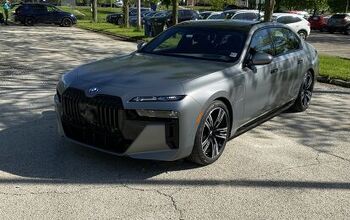Ford Decides Against Dumping AM Radio

Ford CEO Jim Farley took to social media on Tuesday to announce that the automaker is reversing a decision to remove AM radio from its vehicles. The alleged concern was that all-electric vehicles would interfere with the signal and that listening trends were moving away from the relevant bandwidth. However, opponents noted that localized emergency broadcasts frequently end up on AM radio and that the airwaves likewise tend to be home to political talk shows or religious broadcasts.
“We’ve decided to include it on all 2024 Ford and Lincoln vehicles,” Farley stated on Twitter and LinkedIn. “For any owners of Ford’s EVs without AM broadcast capability, we’ll offer a software update [to restore it.]”
Though it wasn’t just station owners and fans of AM radio that bemoaned the industry’s preference to move away from amplitude modulation. On Wednesday, a bipartisan group of federal lawmakers introduced a bill that requested the National Highway Traffic Safety Administration to require AM in new vehicles.
The “AM for Every Vehicle Act” cites the importance and prevalence of AM radio in rural areas and its historic use in disaster scenarios and emergency broadcasts. According to the Associated Press, the Federal Communications Commission (FCC) and National Association of Broadcasters praised the legislation, which was backed by Sen. Ted Cruz (R-Texas), Rep. Josh Gottheimer, (D-N.J.), Rep. Tom Kean, Jr., (R-N.J.), Rep. Marie Gluesenkamp Perez, (D-Wash.), among others.
From AP:
Sen. Edward Markey, D-Mass., one of the bill’s sponsors, has said eight of 20 major automakers including Ford, BMW and Tesla have pulled the band from new vehicles.
“Ford’s reversal reflects an overdue realization about the importance of AM radio, but too many automakers are still going the wrong direction,” Markey said in a written statement Tuesday. He said Congress should still pass the bill to keep access to the band.
Ford removed AM from the 2023 Mustang Mach-e and F-150 Lightning electric pickups after data collected from vehicles showed that less than 5 [percent] of customers listened to it, spokesman Alan Hall said. Electrical interference and reducing cost and manufacturing complexity also played a role.
The company also took it out of the 2024 gasoline-powered Mustang, but will add it back in before any of the muscle cars are delivered, Hall said.
The Alliance for Automotive Innovation, a massive trade group that represents most major automakers, criticized the bill, saying it was unnecessary. It noted that the Federal Emergency Management Agency’s Integrated Public Alerts and Warning System can already distribute safety warnings across AM, FM, internet-based and satellite radios and cellular networks.
But things become a bit more complicated if the grid goes down or someone’s driving through a region where internet/cell connectivity is spotty and the above does not address the countless stations that would be impacted by having their channels made inaccessible on modern vehicles. While not nearly as popular as it used to be, AM radio still sees roughly 80 million people listening every month.
It’s also getting tiresome seeing automakers removing features from vehicles and claiming it's a sign of progress. While the industry may see the benefits of forcing customers into connected services that offer enhanced levels of data collection and the prospect of new revenue streams, consumers are growing tired. The downsides of permanent vehicular connectivity are becoming known.
We’ve already seen General Motors taking heat over vowing to eliminate Apple CarPlay from future products. The AM radio snafu feels related and feels like it’s going to be similarly unpopular. Drivers do not want to have preexisting choices stripped away or repackaged and then sold back to them. They want modern vehicles to add features and be superior to what came before or at the very least something approaching the status quo with a lower price tag.
[Image: Proxima Studio/Shutterstock]
Become a TTAC insider. Get the latest news, features, TTAC takes, and everything else that gets to the truth about cars first by subscribing to our newsletter.

A staunch consumer advocate tracking industry trends and regulation. Before joining TTAC, Matt spent a decade working for marketing and research firms based in NYC. Clients included several of the world’s largest automakers, global tire brands, and aftermarket part suppliers. Dissatisfied with the corporate world and resentful of having to wear suits everyday, he pivoted to writing about cars. Since then, that man has become an ardent supporter of the right-to-repair movement, been interviewed on the auto industry by national radio broadcasts, driven more rental cars than anyone ever should, participated in amateur rallying events, and received the requisite minimum training as sanctioned by the SCCA. Handy with a wrench, Matt grew up surrounded by Detroit auto workers and managed to get a pizza delivery job before he was legally eligible. He later found himself driving box trucks through Manhattan, guaranteeing future sympathy for actual truckers. He continues to conduct research pertaining to the automotive sector as an independent contractor and has since moved back to his native Michigan, closer to where the cars are born. A contrarian, Matt claims to prefer understeer — stating that front and all-wheel drive vehicles cater best to his driving style.
More by Matt Posky
Latest Car Reviews
Read moreLatest Product Reviews
Read moreRecent Comments
- Rover Sig 2021 Jeep Grand Cherokee Limited, like my previous JGC's cheap to keep (essentially just oil, tires) until recent episode of clunking in front suspension at 50K miles led to $3000 of parts replaced over fives visits to two Jeep dealers which finally bought a quiet front end. Most expensive repair on any vehicle I've owned in the last 56 years.
- Bob Hey Tassos, have you seen it with top down. It's a permanent roll bar so if it flips no problem. It's the only car with one permanently there. So shoots down your issue. I had a 1998 for 10 years it was perfect, but yes slow. Hardly ever see any of them anymore.
- 3-On-The-Tree 2007 Toyota Sienna bedsides new plugs, flat tire on I-10 in van Horn Tx on the way to Fort Huachuca.2021 Tundra Crewmax no issues2021 Rav 4 no issues2010 Corolla I put in a alternator in Mar1985 Toyota Land Cruiser FJ60 280,000mi I put in a new radiator back in 08 before I deployed, did a valve job, new fuel and oil pump. Leaky rear main seal, transmission, transfer case. Rebuild carb twice, had a recall on the gas tank surprisingly in 2010 at 25 years later.2014 Ford F159 Ecoboost 3.5L by 80,000mi went through both turbos, driver side leaking, passenger side completely replaced. Rear min seal leak once at 50,000 second at 80,000. And last was a timing chain cover leak.2009 C6 Corvette LS3 Base, I put in a new radiator in 2021.
- ChristianWimmer 2018 Mercedes A250 AMG Line (W177) - no issues or unscheduled dealer visits. Regular maintenance at the dealer once a year costs between 400,- Euros (standard service) to 1200,- Euros (major service, new spark plugs, brake pads + TÜV). Had one recall where they had to fix an A/C hose which might become loose. Great car and fun to drive and very economical but also fast. Recently gave it an “Italian tune up” on the Autobahn.
- Bd2 Lexus is just a higher trim package Toyota. ^^


































Comments
Join the conversation
Alliance for Automotive Innovation = Alliance for Feature Deletion
"The company also took it out of the 2024 gasoline-powered Mustang"
• And now we know that the "all-electric vehicles would interfere with the signal" reason wasn't really the reason.